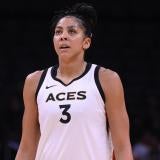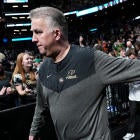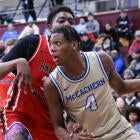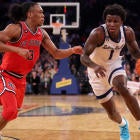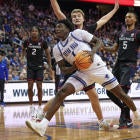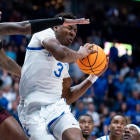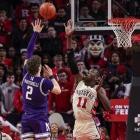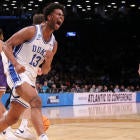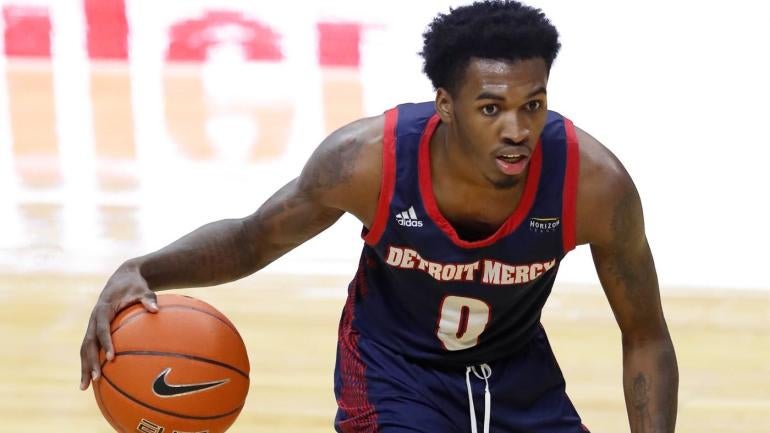
One of them is pacing to being a top-three scorer in the history of college basketball.
Another, the tallest athlete in college sports and the reigning shot-block king of men's college hoops.
The third is a high-level combo guard coming off an NCAA Tournament appearance, helping guide his school to its first Big Dance in 24 years.
Detroit Mercy's Antoine Davis, Western Kentucky's Jamarion Sharp and San Francisco's Khalil Shabazz all hail from mid-major programs. They all recently decided to put their name in the transfer portal. You couldn't be blamed for assuming Davis, Sharp and Shabazz were off to supposedly bigger and better things. Except, wouldn't you know it, despite all three being recruited by power-conference programs, they decided to turn down those courtships and scholarships.
The trio took their names out of the portal earlier this month and will instead return to play another season for the Titans, Hilltoppers and Dons. Other recent double-backs at the power-conference level include DJ Jeffries and Shakeel Moore opting to stay at Mississippi State, and Adam Miller keeping on at LSU. They went into the portal in April after their schools hired new coaches. But not everyone who chooses to go into the portal winds up leaving. These kinds of humble-yet-meaningful decisions don't get the big headlines or prompt discussion the way other transfer-related news does, so let's take time here to shine a light, specifically on the mid-major standouts.
Are Davis, Sharp and Shabazz the exceptions? Yes. Plenty of high-achieving mid-major players have gone into the portal, sought greener pastures and, well, sought the green. Cash. NIL deals and allegations of money to be made. There's nothing overtly wrong with that (though some of it happening is inevitably illegal). But for all of the hypocritical haranguing from coaches about "sticking it out" and "loyalty" and "not running from adversity," here are three players serving up a fresh reminder that not every mid-major transfer ends up leaving.
Take Davis. No player in the portal was as offensively proven as Detroit Mercy's all-time scoring leader. Few have as much credibility to seek an up-transfer as the guy who's scored 2,734 points the past four seasons. The Titans star considered Maryland, Georgetown, Kansas State and BYU. After a few weeks of visits and contemplation, he wound back up where he started.
"The schools I went and visited were all really, really good schools," Davis told CBS Sports. "But I felt like it didn't feel right to not want to win here and end my career here."
It would have been entirely reasonable for Davis (a former three-star recruit out of high school who signed to play at Houston before his dad, Mike Davis, was hired to coach at Detroit Mercy) to scratch the itch. He's averaged a gaudy 24.6 points across his four seasons in the Horizon League, but never made the NCAA Tournament.
"When I went on my visits, seeing the facilities and everything they get, the gear and everything, it can put you in a position to want to go there," he said. "But it's not always, like, if you're in a situation where it's the best situation for you, you don't necessarily need to do it. You can make it from anywhere. Being a mid-major player, it may be harder, but Robert Covington came from Tennessee State. You can make it from anywhere. I don't look it at it like you have to be a high-major player to make it. I feel like a lot of athletes think of when they start at a school, they feel like they have to go high-major in order to make it, but NBA scouts and even NFL scouts for football, you're going to get looked at regardless. Being mid-major isn't as bad as what people make it out."
Shabazz echoed a similar sentiment.
"Whatever decision you make, you have to rock with it," Shabazz said. "I've seen countless guys who were in situations like mine, or similar to mine, and they do their couple years and want to transfer up, which is fine, but the grass isn't always greener."
Davis at home with dad in Detroit
Since Mike Davis will be coaching at Detroit Mercy again next season, Antoine Davis will have a chance to set the all-time scoring record in college basketball. Pete Maravich, who had no 3-point line to shoot from when he scored 3,667 points from 1967-70, has held a record thought to be unbreakable for five decades. Davis, who is getting the boost of an extra year due to COVID, will bring that assumption into doubt. But: He will need to average north of 28 points and play in all of his team's games next season in order to get there
Davis said the prospect of breaking the record (he'll have more touches and shots with the Titans than at a power-conference program) didn't factor into his decision. It was about staying with Dad.
"It brought us closer together," Davis said. "We grew a great bond from one another off this four-year experience with him being my coach. There have been some ups and downs through it, but it's something that we really bonded [over] and it's such a great relationship off of this."
Unrelated but still notable: Davis had an NIL deal in the works before he decided where he'd play his final season of college. TGBTG Sports Management Group inked Davis to an agreement that will feature his name and logo (Davis is in the process of finishing the design himself) on basketballs that glow. (They're called, wait for it, "Glow Balls.") The manufacturing is done through a Chinese company, and if Davis sells more than 3,000 balls he told CBS Sports his earning potential will be in the six figures. He wants to split the profits of this NIL deal with his teammates.
"I didn't have any NIL money or deals coming out when it first started — I was making T-shirts and graphic designs and paid it out of my pocket and ended up making the same money back for it," Davis said. "That was the only thing I had going for me with NIL. Everybody else was getting certain deals, big deals, but I'm trying to give back to my teammates who won't get that opportunity."
For as much noise that is made by coaches and administrators — often without attaching their names to their quotes on the record, for fear of backlash — there are also stories of players doing things for the greater good. It's a volatile and uncertain time in many respects in college sports. There's paternalism from coaches and administrators that's crept into the proceedings, and while some of this control-seeking-disguised-as-concern comes from a place of sincerity, some of it also comes from a place of dread. Dread over the unknown. Dread of change. Dread of loss of power. That paternalism can also be dismissive of the thought, care, intelligence and true intentions of the players at the center of these decisions. Not everyone goes into the portal for the same reasons. Yes, some choices will backfire. But the players aren't given enough credit for making these decisions or knowing what they're doing.
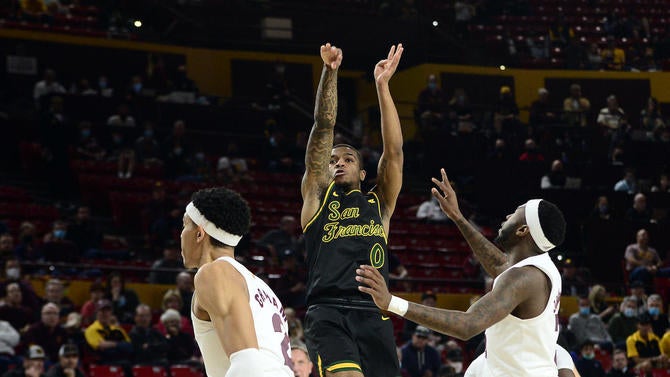
Shabazz shuns offers to stay with Dons
Shabazz had his world toppled less than 24 hours after playing in his first NCAA Tournament game. On the team flight back to San Francisco, news broke that Dons coach Todd Golden would be leaving to coach at Florida.
"As soon as we got the news on the plane I was thinking about my future," Shabazz told CBS Sports. "I thought, Damn, do I have to transfer? What's my situation?"
Shabazz eventually entered the portal, a decision he did not come to lightly. He said that it was more than just Golden leaving. Other staff members and the team's strength coach were also leaving. But because the university promoted from within, hiring Chris Gerlufsen to be the new coach, it always kept USF in the equation. Nearly 25 schools contacted Shabazz.
"That weekend was crazy, calls from all types of schools, Power Fives, good conferences, no-to-so-good conferences, and weeding out the schools I wouldn't even consider," Shabazz said.
Gerlufsen allowed him to take a step back and weigh his options.
"A lot of it is uncharted water, even for guys who have been head coaches for a long time and obviously uncharted for me being a first-year head coach," Gerlufsen said. "I took comfort in being there for a year, establishing meaningful relationships with the players in the program. When you have strong bonds with kids to begin with and you establish that with them on the front end with no pretenses, and you come into the coaching role, it makes it a little smoother.
"I always felt confident that we would have a really solid chance of getting him back here, and some of that again goes into what him and I's personal relationship is. I get where Khalil was coming from with wanting to explore his options. He's a guy who has scraped and clawed for everything in his life and hasn't ever been given anything."
Shabazz only had D-I offers from USF and Cal Baptist coming out of high school. He never had a "true recruiting process," he said. Shabazz admitted that Gerlufsen's trust to let him explore without asking too much or prying into his decision was a huge factor in ultimately deciding not to leave. As Shabazz put it: "They were giving me my space." That's not easy for a lot of coaches to do when their best player goes into the portal.
To hear Gerlfusen explain it, part of it is being willing to let him go in order to get him back. The way this can sometimes go is a coach will want to remove a player who's transferring from the rest of the team, including a lot of activities. It was just the opposite for Gerlufsen. Shabazz was interacting with his teammates daily, in all the weight-room sessions, playing pickup, keeping him engaged without asking him to do it or putting any pressure on him.
When Shabazz had made up his mind, he texted Gerlufsen in the evening, just before Shabazz was getting out of class. Gerlufsen knew it was going to be very good or very bad. When they met in Gerlufsen's office, Shabazz told him he had an opportunity he couldn't pass up. He told him he was leaving to play at another school.
Gerlfusen said that, in that moment, "My heart dropped in my stomach."
Then Shabazz started laughing. He fooled him.
"Everyone in the building I think heard me," Gerlufsen said.
"I always knew where home was, so it was easy for me to say I wanted to come back," Shabazz said. "For the last four years I've solidified myself. I wouldn't say I'm a typical student-athlete, but I'm very creative and do a lot of things outside of basketball. Being able to play free, have freedom, not have to play in a box. I don't have a problem with structure, but I didn't want to boxed off like, 'Hey, you can't do this, you can't do that.'"
Few players I've interviewed in the past year or so about NIL have been as blunt, clear-eyed and pragmatic about the issue as Shabazz. Yes, he believes college athletes deserve a right to profit off their abilities while playing in college. No, it wasn't his primary factor in his decision whether or not to transfer. But it is an option and players deserve the right to pursue those opportunities, he said.
"It's a new day with NIL and things like that and I was listening to those type of opportunities," Shabazz said. "You see guys getting paid crazy amounts, and I don't expect to get paid that much, but I feel like I'm not quite getting what I'm worth. I feel like I'm not being compensated for the things I deserve. You're on social media and you see guys getting $400,000 deals, guys getting half a million, guys getting a million. There's over 1,500 dudes in the portal and everyone gets a whiff. That's a lot of the guys' motives."
There will be opportunities for Shabazz and other USF players this offseason. The team is coming off its best season in decades. With Jamaree Bouyea off to the NBA, with the potential to get drafted, the Dons will be Shabazz's team in his final season of college basketball.
"I didn't make my decision to go against the stigma or show people you can stay at your school or whatever, but at the end of the day you've got to do what's best of you," Shabazz said. "If it works out, kudos to you. And if it doesn't, it's something you've got to live with. ... If you're putting up the numbers and doing what you're supposed to do. When it comes to big games, tournaments, if you show up, they're going to see you."
Sharp's decision to stay at Western Kentucky
Sharp averaged a sport-best 4.62 blocks last season. At 7-foot-5, he's the tallest athlete in the NCAA. He entered the portal on April 29. Ten days later, he removed his name from the portal. Multiple sources said Sharp was bothered by the portal recruiting experience, which serves as a needed reminder that this process isn't the whimsical affair as it is often depicted.
Days after Sharp put his name in, reports surfaced that he was likely going to Missouri; that was never Sharp's desire. He loves Bowling Green, Kentucky, and playing for the 'Toppers. He feels a bond with that community, a person close to Sharp said.
Sharp's height and defensive acumen would've made him a welcomed addition at any program in the country. He didn't need that, nor was he seeking it, no matter what someone representing Sharp claimed in cold call-type text messages to head coaches across the country. (Something that happened, according to sources, and the scope of which could have been without Sharp's knowing.) He'll share his story eventually, but for the time being, Sharp is choosing to lay low (Sharp and WKU coach Rick Stansbury declined interview requests for this story).
Sharp's quick boomerang reminds us that very good players aren't always looking to move up. In fact, sometimes it can be people around that player, more than the player himself, looking to capitalize on change.
Not every player who is looking to make a move is doing so for the money or because they're pissed off at their coach. Sometimes they just want to do some exploring. Some need a change. Not all who wander are lost; some might not even leave. Coaching staffs have regular and widespread turnover annually, and those moves can be just as impactful as prematurely losing a player, but where is the griping in college sports over that?
There isn't any.
A right that should have been afforded to college athletes for decades and is only now coming into being a custom. Now that it's here, wouldn't you know it: some are choosing to stay anyway. All they wanted was the opportunity to fully, officially look around before making that decision — instead of having it made for them.







